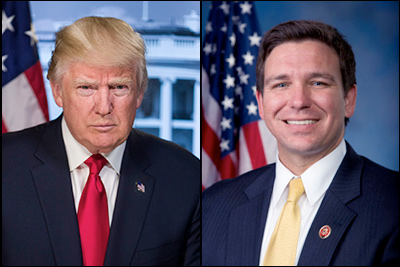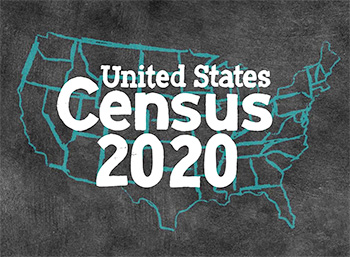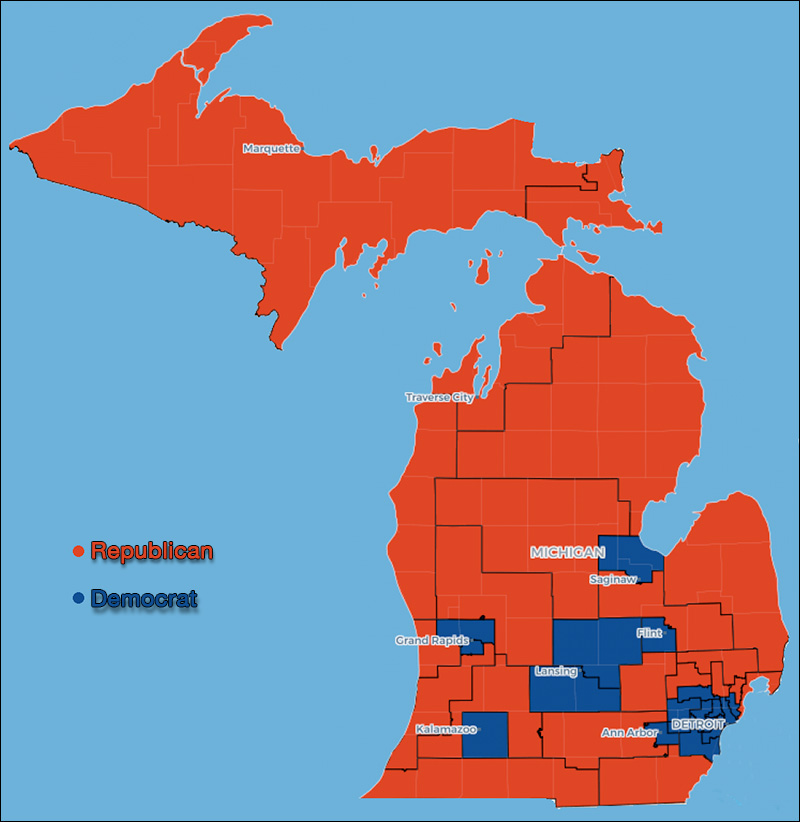By Jim Ellis — Thursday, March 2, 2023
President

Former President Donald Trump; Florida Gov. Ron Desantis
Emerson College is reporting the results of their latest national survey (Feb. 24-25; 1,060 registered US voters; interactive voice response system & online panel) and while some of the results are consistent with other polling – former President Trump leading Gov. Ron DeSantis and the GOP field by a wide margin nationally; President Biden upside-down on the job approval question (44:50 percent) – other data points are proving more interesting.
First, in the general election ballot test, Trump records a 46-42 percent edge over President Biden nationally, which is one of his better polling showings. Second, in contrast to several other recent national polls, the 476 tested Democratic primary voters give overwhelming support, 71 percent, to President Biden as the 2024 party nominee. Interestingly, a whopping 85 percent within the youngest segment, those aged 18-34, are supportive of this position. Third, while Trump records a 55-25 percent national lead over Gov. DeSantis, the latter manages to gain among Hispanics, college educated Republican voters, GOP voters over 65, and Midwest respondents when compared with Emerson’s January poll.
Marianne Williamson: Biden’s First Dem Challenger Emerges — Author Marianne Williamson (D), who ran for President in 2020 but fared very poorly in that year’s Democratic nomination campaign, said she will formally announce her 2024 national campaign on Saturday. Williamson will not become a major factor in the race, but could earn some delegates in New Hampshire if the state fails to adhere to the Democratic National Committee schedule and, as a result, President Biden decides not to enter the state’s primary. Otherwise, a Williamson campaign will be a non-factor.
Senate
Texas: New Democrat Potential Candidate Emerging — Democratic leaders have been attempting to recruit a strong opponent for Sen. Ted Cruz (R) as he seeks a third term next year, and most of the early speculation has centered around former HUD Secretary, presidential candidate, and ex-San Antonio mayor, Julian Castro, and US representative and former NFL football player Colin Allred (D-Dallas). With neither man so far jumping into the race, statements from Texas Democratic Party chairman Gilberto Hinojosa, as reported in the Daily Kos Elections blog, suggest that outgoing Houston mayor and former veteran state Rep. Sylvester Turner may be moving toward becoming a candidate.
Democrats are expected to make a run at Sen. Cruz, but in a presidential election year with the turnout model almost assuredly favoring the eventual Republican presidential nominee the future Democratic candidate will be in a decided underdog position.
Michigan: Rep. Slotkin’s Senate Track — Three-term US Rep. Elissa Slotkin (D-Lansing), as expected for weeks, formally announced that she will run for the Senate next year. In December, four-term incumbent Debbie Stabenow (D) announced that she will retire at the end of this Congress. Rep. Slotkin, one of the more prolific fundraisers in the House, is already perceived as the favorite for the Democratic nomination and the general election.
Though there was much activity right after Sen. Stabenow announced that she would step down, only one elected official, Michigan School Board member Nikki Snyder (R), has actually declared her candidacy until Rep. Slotkin made her intention known.
While Rep. Slotkin has the inside track to the Democratic nomination and may not even face a significant intra-party opponent, several Republicans are still contemplating whether to run for the open Senate seat. Among them are former gubernatorial nominee Tudor Dixon, US Rep. Bill Huizenga (R-Holland), and former Reps. Fred Upton, Mike Rogers, and Peter Meijer.
Prominent Michigan politicos who have said they will not run for the Senate include Gov. Gretchen Whitmer (D), Lt. Gov. Garlin Gilchrist (D), Attorney General Dana Nessel (D), Secretary of State Jocelyn Benson (D), US Reps. Haley Stevens (D-Birmingham) and John James (R-Farmington Hills), and state Senate Majority Whip Mallory McMorrow (D-Oakland and Wayne Counties).
House
CA-12: First Open-Seat Candidate Emerges — Bay Area Rapid Transit Board member Lateefah Simon (D) became the first individual to announce her candidacy for California’s new open 12th District, which encompasses the cities of Oakland and Berkeley. Twelve-term Rep. Barbara Lee (D-Oakland) is leaving the House to run for the Senate.
The 12th, a coalition majority minority seat, is the most Democratic district in this bluest of states. The FiveThirtyEight data organization rates it D+77, while the Dave’s Redistricting App partisan lean finds a 89.7D – 8.3R spread. Therefore, two Democrats advancing to the general election in what is expected to be a crowded all-party qualifying election field is a virtual certainty.
Potential candidates include state Sen. Nancy Skinner (D-Berkeley), Assemblywomen Mia Bonta (D-Oakland) and Buffy Wicks (D-Oakland), former Oakland Mayor Libby Schaaf (D), and several local officials.
Governor
Louisiana: Democrats Uniting — While the candidate filing deadline for this year’s Louisiana governor’s race is still more than five months away, Democrats appear to already be uniting behind one candidate. Shawn Wilson is the outgoing state Secretary of Transportation who will be resigning from office on March 4. His official gubernatorial announcement will come soon after. Gary Chambers (D), who ran against Sen. John Kennedy (R) last year and was viewed as a potential candidate now says he will not run and is lining up behind Wilson. Term-limited Gov. John Bel Edwards (D) has already given his tacit endorsement to Wilson.
All of this likely means Wilson will surely advance into the general election runoff. Republicans will split their votes, thus ensuring that no candidate will reach the 50 percent mark in the Oct. 14 all-party jungle primary. The top two finishers will advance into the Nov. 18 general, meaning Wilson will await the outcome of a tight GOP gubernatorial nomination contest. Republicans will be favored to convert the Louisiana governorship, but Democrats are clearly doing their best to correctly position themselves for the autumn election.
 Census Reapportionment: The Hidden Votes — Already, the 2024 presidential race has actually gotten closer. The 2020 national election was decided by a 74 electoral vote margin, a 306-232 margin for Democrat Joe Biden. Without any state changing its 2020 outcome, however, his victory spread has now decreased to 68 EVs.
Census Reapportionment: The Hidden Votes — Already, the 2024 presidential race has actually gotten closer. The 2020 national election was decided by a 74 electoral vote margin, a 306-232 margin for Democrat Joe Biden. Without any state changing its 2020 outcome, however, his victory spread has now decreased to 68 EVs.






